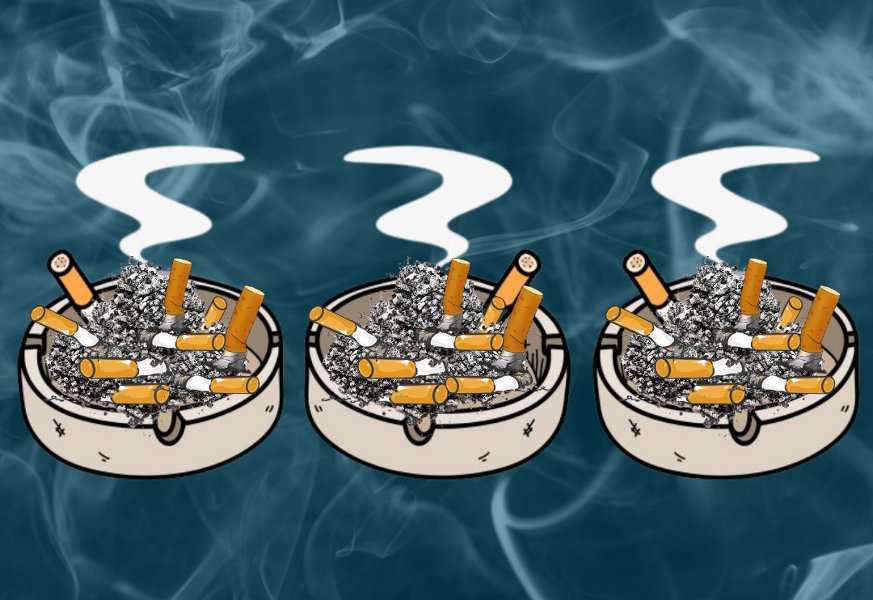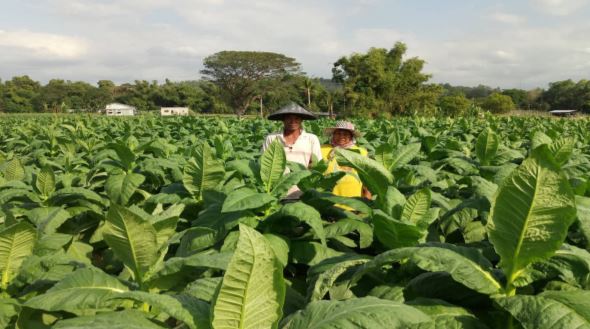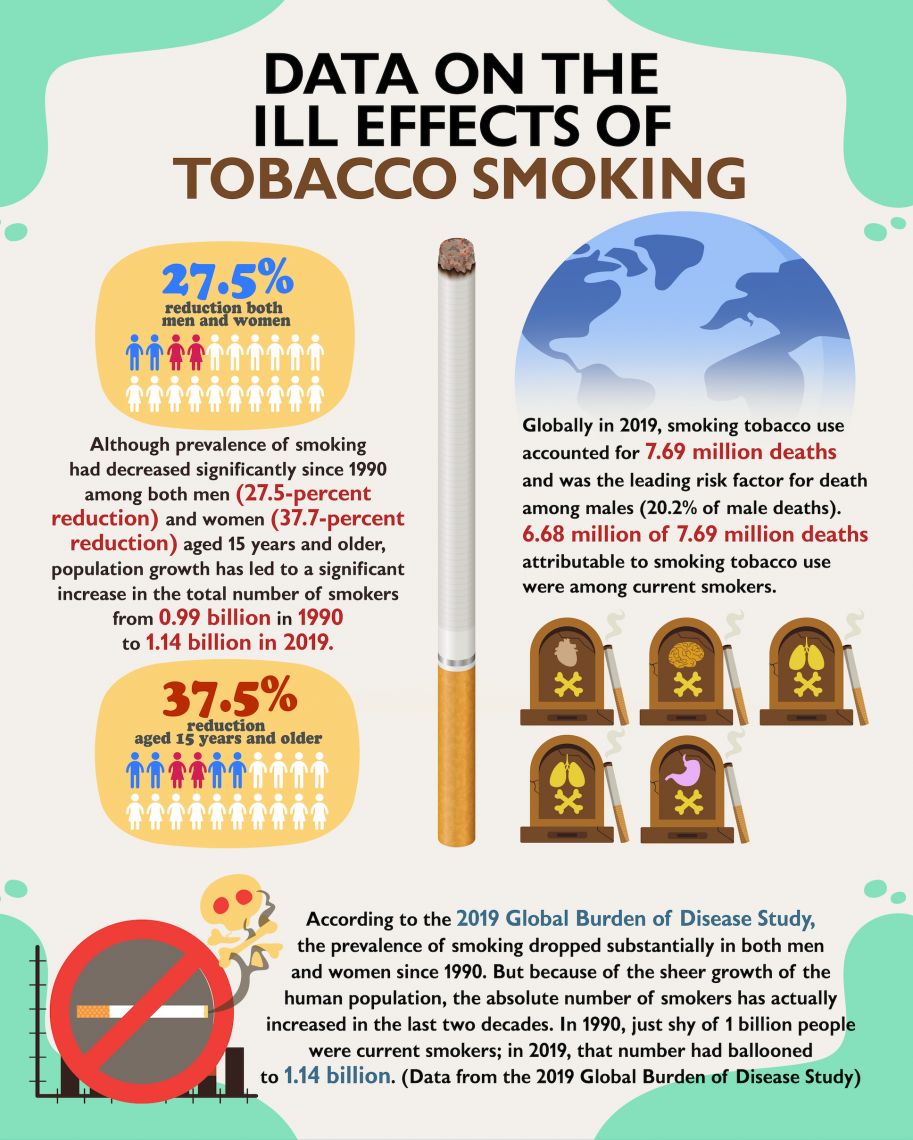With the streets deserted and stores closed for much of the first year of the COVID-19 pandemic, the rumbling of motorcycles could be heard in the air. Delivery drivers crisscross the cities bearing essential pantry items or fast-food cravings to their anxious recipients.
As the pandemic enters its third year, those rumblings grow louder as people continue to rely on online stores from the safety of their homes — ordering through digital apps and social media pages, and buying anything imaginable from electronics, to plants, office furniture, among many others.
One product’s availability online that many find worrisome is tobacco.
It’s easy to buy a pack of cigarettes through a convenience store listed on a popular food delivery app. All it takes is to click “accept” on the conditions declaring that the buyer is of “legal age to purchase tobacco products.”
The Department of Finance (DOF) and Department of Health (DOH) flagged the issue last July 2020, when it proposed a ban on selling “unlisted online sale of ‘sin’ products,” including tobacco. But Congress has passed legislation that watchdogs say can potentially weaken existing regulations for tobacco — specifically for e-cigarettes, vaping, and heated tobacco products.
As tobacco companies continue to do business via these online platforms, they also continue to chip away at policies protecting the public from smoking’s hazardous effects.
How these issues are addressed will be indicative of the direction the Philippines will take in its fight against tobacco use and addiction, even beyond the pandemic.
Taxing tobacco
Market research firm Euromonitor marked the “notable impact” of COVID-19 to tobacco sales. While cigarette sales grew by 31% to more than PHP 369 billion in 2020, volume of cigarette sticks sold actually decreased by 12% to around 54.7 billion sticks.
They attribute this to constraints on mobility and distribution, and lower disposable income due to the pandemic’s economic fallout.
But why the “growing sales” despite the slump in volume? The answer is higher excise taxes.
The current rate imposed on tobacco products is mandated by Republic Act 11346, signed into law on July 25, 2019. Under the measure, taxes on cigarettes were increased to PHP 45 per pack on January 1, 2020. This goes up by PHP 5 every year until 2023, and by 5% beginning 2024.
But significant taxation reform began in 2013, when the Sin Tax Reform Law of 2012 took effect. The landmark legislation, which passed despite intense lobbying from the tobacco industry, was hailed for increasing taxes on tobacco and alcoholic products. The collection is earmarked to fund universal healthcare, as well as programs to help tobacco farmers who may be adversely affected by the policy.
In 2020, the Bureau of Internal Revenue collected PHP 148.45 billion in excise taxes from tobacco products, higher than the target of PHP 139.12 billion.
Because of higher taxes, smoking prevalence among adults 20 years old and above significantly dropped — from 25.4% in 2013, the first year of the Sin Tax Reform Law, to just 19.9% in 2019, according to the Department of Science and Technology’s Expanded National Nutrition Survey.
Dr. Jaime Galvez Tan, former DOH secretary, says that among all proposals to curb tobacco, raising taxes had the most significant effect based on evidence from other countries such as Australia and Hong Kong.
He and another former DOH secretary and senator Juan Flavier were among the first to propose higher taxes during the administration of Fidel V. Ramos in the 1990s. The late former president Benigno S. Aquino III would successfully push for the measure more than a decade later.
“Definitely, the greatest victory is still the taxes,” Galvez Tan said.
Despite this “victory,” however, taxes collected from tobacco products are still not enough to cover the economic costs of smoking, estimated at PHP 210 billion as of 2015, according to the Action for Economic Reforms.
Dr. Maria Encarnita Blanco-Limpin, executive director of Action on Smoking and Health (ASH) Philippines, noted that while the country “made some strides” in cutting smoking prevalence, it is still among the highest globally.
“We have not yet really reached the point where we have strong tobacco measures in place to ensure that we can effectively bring down smoking prevalence,” she said in a July 20 press briefing.
However, the above figures largely do not even account for the impact of e-cigarettes and heated tobacco products, which are gradually gaining a foothold in the Philippine market.
‘A new epidemic’
The COVID-19 lockdown also had a negative effect on the sales of smokeless tobacco, e-vapor products, and heated tobacco.
Heated tobacco products (HTPs), for instance, which only entered the Philippine market in 2017, netted in sales of PHP 105.9 million.
(In accordance with Republic Act 11467, enacted in January 22, 2020, HTPs are also taxed PHP27.50 per pack of 20, much lower than the PHP50 tax rate for a pack for cigarettes.)
Euromonitor also noted that physical stores in malls and neighborhood vape shops, which were “essential to generating sales and awareness,” saw lesser foot traffic due to mobility restrictions and shortened operating hours.
However, sales of e-vapor products from online e-commerce platforms such as Facebook, Lazada, and Shopee flourished amid the lockdown, even if it were not enough to offset the losses for 2020.
E-vapor products sales were at PHP 2.7 billion, a 17% decline from the year prior, according to the market research firm.
The DOH and the FDA have cautioned the public regarding the harmful chemicals in these devices, including the highly-addictive nicotine.
Still, the marketing, sale, and purchase of such products continue. They are often touted as a “harm reduction” option for smokers who wish to kick the habit, even though there are no conclusive data to support such a claim. Researchers and health advocates find the continued presence of HTPs in the market worrisome, and warn against marketing such products to non-smokers, especially the youth.
A 2020 online study by the Philippine Pediatric Society and the Department of Education revealed that 6.7% of the 11,500 Grades 7 to 9 students surveyed have tried or are using e-cigarettes. Among the top reasons cited for use were vape’s online accessibility (32%), friends who are also vapers (31%), its varied flavors (22%), and the belief that e-cigarettes are safer than tobacco (17%).
Blanco-Limpin warned of an “emerging epidemic” of vaping if no substantive controls are passed.
Thus, advocates are calling for stricter regulation of these new products even as President Rodrigo Duterte signed Executive Order 106, banning their use in public places as well as requiring these products to register with the FDA.
Congress, however, has passed legislation that weakens regulation of e-cigarettes and heated tobacco products. The DOH and FDA have opposed the measure.
House Bill 9007, which was approved in third reading last May 26, decreases the age of access for e-cigarettes and heated tobacco products from 21 to 18 years old. It will also allow vaping in public open spaces and allow advertising in mass media. Online sales will also be allowed.
A similar bill (Senate Bill 2239), filed by Senators Manny Pacquiao, Vicente Sotto III, Juan Miguel Zubiri, Francis Tolentino, Ralph Recto, and Pia Cayetano, was approved in the Senate on final reading on December 16.
A harmonized version of the two bills was approved by Congress just more than a week ago, under which regulation of these novel tobacco products will be transferred from the FDA to the Department of Trade and Industry, signifying that the matter is viewed as a “trade issue” rather than a “health issue.”
Sophia Monica San Luis, executive director of ImagineLaw, described the bills as “regressive,” and their timing “ironic,” in the face of COVID-19.
“They do not improve policy in favor of public health, and they weaken public policy in favor of commercial interests,” San Luis said in a July 20 media briefing. “What is clear is that these policies will not help people quit. It will only lead to the addiction of a new generation.”
Passing such laws are described as “two steps backward” after the recent successes of the Philippine government to enact “prudent” regulations in the face of extreme pressure from the tobacco industry.
Long history of tobacco interference in the Philippines
An overview report on the tobacco industry in the Philippines observed the country as having the “strongest tobacco lobby in Asia” while being “among the world’s slowest nations to take tobacco control seriously.”
For decades, tobacco companies took advantage of weak institutions to maintain their hold on the market, despite solid evidence on smoking’s detrimental effects to public health.
“The Philippines has long been an unrestricted operating environment for tobacco companies, ripe for corruption and exploitation,” concluded a 2004 paper chronicling tobacco industry interference from the 1960s to 1990s.
For instance, politicians bought off by tobacco companies held off cigarette tax increases in the 1970s. Cigarette warning labels, first proposed by the government in the 1970s, were only passed into law in 1991 and enforced in 1994. In comparison, such labels were first required in American cigarette packs as early as 1966.
In the face of scientific consensus against smoking, tobacco industry companies enlisted their own experts in the 1970s and 1980s to cast doubt on these findings.
Advertising, which largely targeted the youth, was unregulated until recently. Tobacco manufacturers enjoyed operating in what the paper described as among the “world’s most laissez faire advertising conditions.”
To put this in perspective, Fortune Tobacco spent USD 17.9 million for its advertising budget in 2000, or 300 times the DOH public information and education budget.
Tobacco ads on the airwaves and print were only banned starting July 1, 2008 — the date mandated by the Tobacco Regulation Act of 2003.
This ban, however, is threatened by a new bill passed by Congress which may allow advertising of e-cigarettes in the media.
“If you think that this is just history, and it’s a thing of the past, you’re wrong. The tobacco industry is back at it. They are using the same old tactics to market their own products,” San Luis said.
Who’s interfering?
In 2010, the Philippine government moved to prohibit all “unnecessary interaction” between the bureaucracy and the tobacco industry with the promulgation of Joint Memorandum Circular (JMC) 2010-01 by the DOH and the Civil Service Commission (CSC).
The JMC was a landmark measure, lauded as one of the models in implementing the World Health Organization’s (WHO) Framework Convention on Tobacco Control (FCTC), ratified by the Philippines in 2003.
The Philippines, however, has been slipping in the Global Tobacco Interference Index — from 12th place in 2019 to 19th in 2020. HealthJustice Philippines noted the country’s “progressive deterioration” through the years.
Reasons for the Philippines’ decline in the index include the continued role of tobacco industry representatives in enforcing and shaping government regulations, as well as “unnecessary interactions” between the industry and top-level legislators, including “an overseas trip which exposed them to Philip Morris International’s UNSMOKE campaign.”
The COVID-19 pandemic also provided a new opportunity for the tobacco industry to chip away at protections meant to shield the government against undue influence.
Last June 2021, some legislators demanded the repeal of the JMC after the DOH disclosed at a House of Representatives hearing that they held onto respirators donated by a tobacco company due to provisions against receiving donations from these firms.
Cagayan de Oro Representative Rufus Rodriguez called the DOH’s action as “criminal negligence,” given that these respirators could have saved lives in his city which was then experiencing a surge in COVID cases.
CSC Commissioner Aileen Lizada also called the JMC “defective,” and claimed that there was no record that then-CSC Commissioner and now DOH Secretary Francisco Duque III was given authority to sign the document.
The DOH later clarified that while it did not accept the donations, it facilitated the delivery of the respirators in question to 10 private hospitals.
Some lawmakers also questioned the donations received by the DOH and FDA from the Bloomberg Initiative to Reduce Tobacco Use as “foreign interference.”
“It is sad that the DOH prioritized the advocacy of foreigners at the expense of the lives of Filipino people,” said Puwersa ng Bayaning Atleta party-list Representative Jericho Nograles, as quoted by the Philippine Daily Inquirer.
AAMBIS-OWA party-list Representative Sharon Garin also said that it was “ironic” that Bloomberg did not help the Philippines during the pandemic while the tobacco industry did, even if the WHO had warned that smoking is a risk factor for developing severe COVID-19 and death.
According to its official website, the Initiative — one of the global programs under the Bloomberg Philanthropies founded by billionaire and former New York City mayor Michael Bloomberg — helps “cities and countries implement measures that are proven to reduce use and protect people from harm, including smoke-free public places, banning tobacco advertising, increasing tax on tobacco products, requiring graphic warnings on cigarette packaging, and mass-media public awareness campaigns.”
It is interesting to note that an organization committed to protecting people from the harmful effects of tobacco is the one being vilified for doing their jobs.
When asked about the representatives’ calls to scrap the JMC, Galvez Tan says that he is “very disturbed.”
“I just want to say to the congressmen who are criticizing this: Why, what is the benefit of tobacco, right? What, really? Does tobacco have benefits to a person’s health, or even to society?”
In a column for VERA Files, lawyer Anna Bueno of ImagineLaw recorded several CSR or corporate social responsibility donations from foundations linked to tobacco companies during the pandemic.
These include a bio-molecular laboratory donation to the Philippine Red Cross from the Lucio Tan Group, parent company of the Fortune Tobacco Company, and personal protective equipment (PPE) donations to Cagayan de Oro City by the Jaime V. Ongpin Foundation, an affiliate of the Philip Morris Fortune Tobacco Corporation.
In a statement, the WHO FCTC recognized that accepting such donations may be a “moral dilemma” for governments especially amid COVID-19. But it also reminded governments that this is part of tobacco companies’ “usual gameplan” of claiming to help them during the pandemic, only to pressure them to ease tobacco control policies.
“Today, the tobacco industry is once again taking advantage of the vulnerable situation of many of our Parties, offering its ‘philanthropic help’ through donations of money, personal protective equipment, ventilators and other resources, in an effort to make the industry look good and enhance its reputation,” said Dr. Adriana Blanco Marquizo, head of the FCTC convention secretariat.
Moving forward
In response, Galvez Tan, along with his fellow erstwhile DOH secretaries, his colleagues in the medical sector, and several tobacco control and health advocate groups denounced calls to scrap the JMC.
“There is no doubt: the move to repeal the JMC is in the interest of the tobacco industry. Removing this important wall between the Philippine bureaucracy and tobacco influence is serving Filipinos’ health on a silver platter to the tobacco industry and its profit-driven interests,” the statement read.
As advocates continue to defend the JMC amid the pandemic, there are other policy proposals in the works.
For Galvez Tan, tobacco excise taxes should be increased further so that prices will reach PHP 300 per pack. While the Philippines was recently recognized as the top ASEAN country in terms of cigarette tax policy for the period 2014-2020, it scored poorly on the affordability of cigarettes, as the country’s prices are still cheaper than its neighbors’ such as Thailand and Malaysia.
“We are still at around PHP 100 per pack. This means, the tobacco industry is still victorious, right?”
Over the past decade, the country has improved on its tobacco control policies, boosting the health sector and cutting smoking prevalence. But in the face of mounting pressure amid a deadly and crippling pandemic, the Philippines has to make a decision: to continue the hard-won gains in cutting tobacco use, or cave in to the pressure of big tobacco for short-sighted interests?
This story is produced under the Nagbabagang Kuwento (Burning Stories) Tobacco Control Media Program of the Probe Media Foundation Inc. supported by the Campaign for Tobacco-Free Kids.




